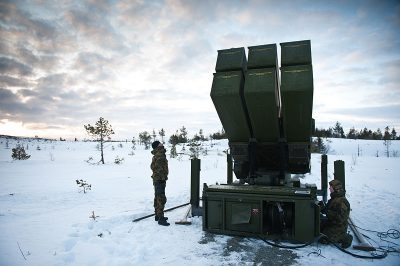
Glenn Diesen is Professor of Political Science at the University of South-Eastern Norway (USN) and known widely for his numerous scholarly books, papers, articles and podcasts. He is also a candidate for Norway parliament election.
While he has written and spoken on a wide range of issues with clarity and courage, it is his writings on NATO’s eastward expansion and on Ukraine that have become a matter of great controversy in a relatively short time in Norway.
Controversy by itself is not too bad but what is deeply troubling for the democracy of a country with people of very high educational attainment is that the views of a very scholarly person, who has a very firm and fine grasp of this particularly important subject on which he is extremely widely read and well-informed, should be misrepresented and on this basis he is repeatedly harassed and very disturbing conditions are created for him.
In a recent article titled ‘How Peace-Oriented Norway Learned to Stop Worrying and Love War’, the deep anguish expressed by Prof Diesen at recent happenings is very distressing and unsettling for anyone concerned with protection of democracy and democratic values in Europe. This article can be read at his sub-stack or at the website Brave New Europe, where it was published on May 26.
Summarizing his views on a controversial subject very briefly, Diesen has written,
“My argument is that Russia considers NATO expansion an existential threat and responds based on these convictions, irrespective of NATO not agreeing with Russia’s threat assessments. I therefore argue for diplomacy and not sending weapons, as it (weapon supply) will only escalate the war, destroy Ukraine and take us closer to nuclear war.”
In several writings and podcasts these views have been expressed by Diesen on his own, or somewhat similar views have been shared with several other very eminent academics like Prof John Mearsheimer and Prof Jeffrey D. Sachs.
What is more, in the course of the eastward expansion of NATO spread over several years, there were over 100 eminent academics, statesmen and former diplomats belonging mainly to the west who had expressed serious reservations regarding this or even opposed this more openly and firmly. There are even cases of heads of government in leading NATO countries opposing this initially, particularly in the context of Ukraine. As Prof Diesen looks around with a sense of ‘reason wounded, trust betrayed’ at the shrill voices, false accusations and more being hurled at him, he recalls his own Prime Minister saying “it is out of question to send weapons” soon after the Russian invasion of Ukraine started.
In a mature democracy, even those implementing or supporting the policy of weapon supply to Ukraine would agree that alternative policies may have a role at some time, and so someone like Prof Diesen, as the leading and highly well-informed scholarly articulator of such an alternative policy in the country, would get the due respect of the authorities and people. His work would be supported, not hindered, and no attempts would be made to obstruct his attempts to reach out to more people.
Perhaps this is what would have happened some years back in Norway, but in recent times Europe has been changing in adverse ways and one part of this has been to think more in terms of imagined ‘good and evil’ and very narrow categorization of ‘us’ and them’. One of the consequences of this has been that a golden opportunity to adopt a wider, more credible and promising concept of European security inclusive of Russia has been lost recently. If in the early days of the USA’s changing Ukraine policy under President Trump, Europe had extended support to this, the enormously tragic war could have ended weeks ago and this would have been the time of very large-scale reconstruction and rehabilitation work being in full swing.
Even senior and experienced analysts have struggled to cope with understanding strange policy choices of European leaders which increasingly appear to be lacking in evidence-based rationality. What is no less troubling is the accompanying decline in democratic norms. As Prof Diesen writes in his article,
“The problem is spreading across Europe. In France, the main opposition leader has been arrested in what is seemingly a politically motivated attack. In Germany the largest political opposition party has been labelled as an ‘extremist organization’ which enables the intelligence agencies to go after its members. It is likely also a first step to banning the opposition party. In Romania, the election results of Presidential elections were cancelled, and the winner was not allowed to run again…Interference in Moldova and Georgia was also done under the banner of defending democracy from Russia.”
Europe was supposed to be a place for protecting democracy, not disrupting it step by step. One hopes that at least belatedly steps will be taken to recognize the recent decline of democracy, instead of being in denial, and to make important and effective efforts to check this decline. Prof Diesen’s deep anguish should be seen as a wake-up call for this.
*
Click the share button below to email/forward this article. Follow us on Instagram and X and subscribe to our Telegram Channel. Feel free to repost Global Research articles with proper attribution.
Bharat Dogra is Honorary Convener, Campaign to Save Earth Now. His recent books include Saving Earth for Children, Planet in Peril, Man over Machine, Earth without Borders and a Day in 2071. He is a regular contributor to Global Research.
Global Research is a reader-funded media. We do not accept any funding from corporations or governments. Help us stay afloat. Click the image below to make a one-time or recurring donation.
Counter Information publish all articles following the Creative Commons rule creative commons. If you don't want your article to appear in this blog email me and I will remove it asap.




















No comments:
Post a Comment